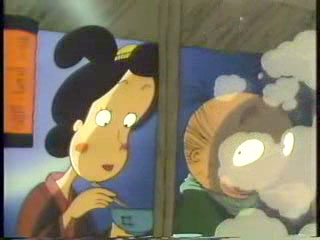高知県の
山の
中の
村に、
夜に
うどんを
売る
店がありました。
There is an udon shop in a mountain village in Kochi Prefecture that is only open at night.
を
鳴らしながら、
優しいおじいさんが
店を
引いてきます。
A kind old man is pulling a cart, walking along and ringing a bell.
、
着物を
着た
きれいな
女性が
うどんを
食べに
来ました。
One evening, a beautiful woman wearing a kimono came to eat udon.
の
夜も、
また次の
夜も、
村で
見たことがない
人が
来て、
うどんを3
杯も4
杯も
食べて
帰りました。
The following night, and even the night after that, strangers whom no one in the village had ever seen came by, ate three or four bowls of udon, and then left.
、
客が
払った
お金は、
次の
日に
なると
木の
葉になっていました。
However, the money you paid turned into leaves the next day.
の
若い
男の
人は、おじいさんが
かわいそうだと
思いました。
The young people in the village felt sorry for the old man.
、
男の
人は
怪しい
客の
着物に
火をつけました。
One night, he set fire to a suspicious guests kimono.
、
客は
驚いて、たぬきの
姿に
変わりました。
Soon, the customer was startled and transformed into a tanuki.
の
人は、たぬきを
強く
殴りました。
The young man hit the tanuki hard.
たぬきは
逃げて
行きました。
The baby raccoon dog ran away.
の
年、
またうどんの
店が
来る
季節になりました。
When the season for udon comes around again next year.
の
人が
外を
見ると、6
匹の
子どものたぬきが
鈴の
音のように
鳴いていました。
When the boy looked outside, he saw six baby tanuki crying out in voices like bells.
んだ
母親のたぬきのことを
思い
出しているようでした。
It seems that they are remembering their deceased tanuki mother.
の
人は、
かわいそうなことをしたと
思って
泣きました。
The boy felt that he had done something pitiful and shed tears.

